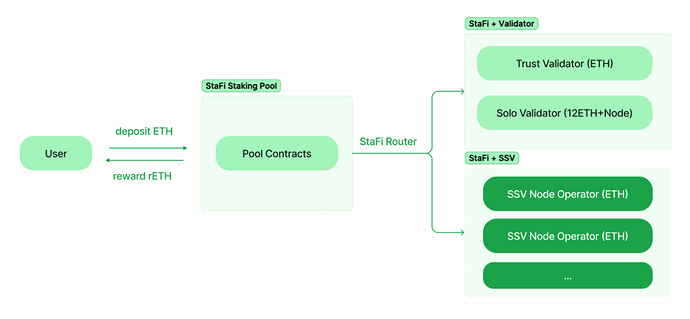Abstract
Introducing the Distributed Validator Technology (DVT) infrastructure SSV into StaFi’s staking, and adding a new module called StaFi Router, which also integrates existing trust and solo validators. This will improve staking security , decentralization, and reduce the probability of validator slash.
Motivation
DVT is an important component of Ethereum’s Roadmap merge. DVT can further enhance Ethereum’s security, decentralization, and reduce the probability of slashing. StaFi will also enjoy these benefits after introducing DVT.
Currently, StaFi has trust validators and solo validators. However, introducing DVT will require additional processing steps, such as DKG, validator management, and modifications to commission fee calculations.To ensure compatibility with existing validator processing logic while also expanding support for DVT, a new processing module called StaFi Router has been introduced.
Specification
Overview
User flow
Architecture
StaFi Router will constantly monitor the pool contract for relevant events, and upon the pool reaching a threshold of 32 ETH, will generate a validator key and initiate registration as a validator on the SSV network. Once the key is verified, SSV operators will activate ETH staking on the Beacon chain by running the node. The registration process of validators will simultaneously be monitored by the StaFi Router, which will route results to Reward Contracts.
Compared to the existing matching system, the solution would be significantly more efficient. Notably, solo validators would not be required to deposit funds, and stakers would not have to rely on the trusted validator set. Instead, the responsibility of staking would lie with operators in the SSV network, who would take on critical tasks such as generating rewards and mitigating penalties and slashing.
StaFi Router
StaFi Router is a suite of off-chain services, focusing on essential tasks such as event listening, service execution, network connection, and more. Unlike StaFi’s permissionless matching system, there will not be a reliance on a specific validator on StaFi-SSV. Instead, StaFi Router will serve like a validator management, generating the validator key offline and register validator on SSV via smart contract.
Automating the staking process through the Router ensures a more efficient and streamlined experience, maximizing staking rewards on StaFi. The Router also prevents a pool of over 32 ETH from remaining un-staked for an extended period of time (depending on the strategy). Additionally, the Router establishes a connection with SSV and listens to staking and rewards-related events. StaFi will develop a Go SDK to facilitate interaction with SSV.
For more details on validator key generation, please refer to the “Validator Key Management” section of this proposal.
Validator Key Management
As the development of SSV’s DKG is currently in progress, the process of generating Validator Keys requires careful consideration of performance and security to ensure a high level of decentralization.
To address this, StaFi will integrate a staking deposit cli that will generate validator keys and store them on specific off-chain machines, resulting in increased security and improved performance.
In the long term, once SSV’s DKG is completed, we will replace the current scheme with SSV’s DKG to further enhance security and decentralization.
Smart Operator Selection
SSV operators are evaluated based on various metrics such as price, status, and performance, as well as dynamic operations such as updated fees and off-boarding. To ensure optimal operator selection, the StaFi Router will periodically search for operator information on the SSV network at certain frequencies.
If a moderately priced operator with good performance is found to be superior to the existing operator, the existing operator will be replaced and reselected. The evaluation process prioritizes performance over price. However, the number of replacements made at a time will not exceed two replacements.
Given the dynamic nature of the open market, updating the selection algorithm is necessary. StaFi will continuously monitor the efficiency of operators and update the algorithm accordingly after the launch. Meanwhile, StaFi will join the SSV network and run nodes as operators, operating validation services with staking experiences and make the SSV network more diversified and decentralized.
Commission Fee
trust validator and solo validator
- StaFi Validator fee = rewards * 0.05
- StaFi Protocol fee = rewards * 0.05
- User (Staker) fee = rewards * 0.9
SSV
- SSV Operator Cost fee = (Operator1 fee + Operator2 fee + Operator3 fee + Operator4 fee + Network fee)* (period + LTP)
- User(Staker) fee = rewards * 0.9
- StaFi Protocol fee = rewards * 0.1 - SSV operator cost
After implementing SSV, the earnings of the stakers remain consistent. However, the earnings from validator share will be replaced by paying SSV fees. These fees will be paid by the StaFi Protocol, which will help to absorb any price fluctuations.
Security Considerations
StaFi Router operates as an off-chain service, there is a possibility of server failures that can result in delayed rewards and prevent the ability to run new validators in SSV. In addition, there is a risk of being targeted by attackers, which could lead to validators being slashed.
Copyright
Copyright and related rights waived via CC0.
- Support this
- Don’t support this
- Need more concrete content
0 voters

